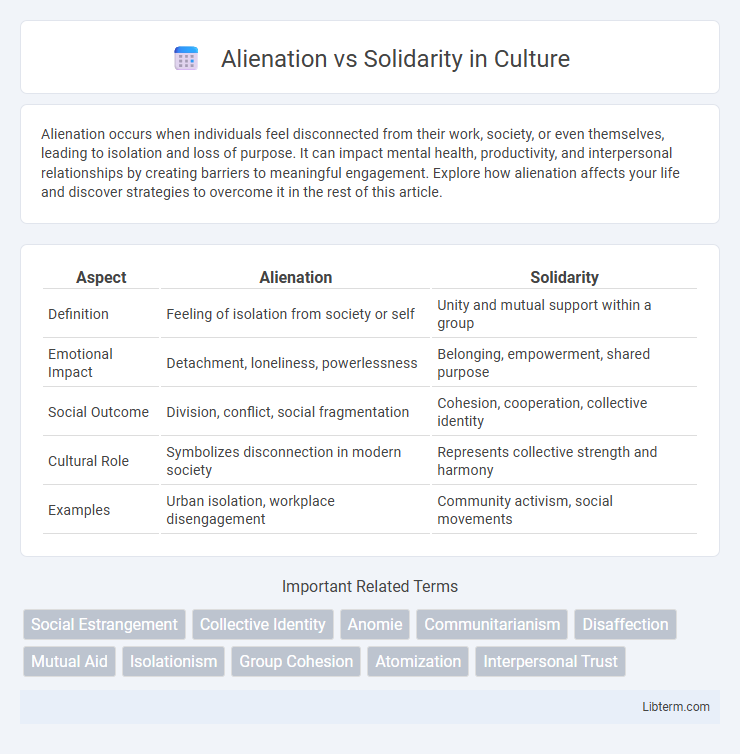Alienation occurs when individuals feel disconnected from their work, society, or even themselves, leading to isolation and loss of purpose. It can impact mental health, productivity, and interpersonal relationships by creating barriers to meaningful engagement. Explore how alienation affects your life and discover strategies to overcome it in the rest of this article.
Table of Comparison
| Aspect | Alienation | Solidarity |
|---|---|---|
| Definition | Feeling of isolation from society or self | Unity and mutual support within a group |
| Emotional Impact | Detachment, loneliness, powerlessness | Belonging, empowerment, shared purpose |
| Social Outcome | Division, conflict, social fragmentation | Cohesion, cooperation, collective identity |
| Cultural Role | Symbolizes disconnection in modern society | Represents collective strength and harmony |
| Examples | Urban isolation, workplace disengagement | Community activism, social movements |
Understanding Alienation: Definition and Origins
Alienation refers to the sense of estrangement individuals feel from their work, society, or self, often resulting from systemic conditions that disconnect people from meaningful engagement. Rooted in Karl Marx's theory, alienation originates in capitalist labor processes where workers lose control over production, leading to separation from the product, the act of labor, their own humanity, and fellow workers. This concept highlights how structural forces can undermine personal identity and social cohesion, fostering isolation rather than solidarity.
The Many Faces of Solidarity
The many faces of solidarity encompass social, political, and economic dimensions where individuals and groups unite to support common goals and collective well-being. Unlike alienation, which isolates individuals through disconnection from their work, community, or society, solidarity fosters inclusion, shared identity, and mutual empowerment. Key examples include labor unions, social movements, and community organizations that build resilience and promote justice through coordinated action.
Historical Contexts: Alienation in Society
Alienation in society emerged prominently during the Industrial Revolution as rapid urbanization and mechanized labor disrupted traditional community bonds and individual identities. Marxist theory highlights how capitalist modes of production create worker alienation by separating laborers from the fruits of their work, leading to social fragmentation and loss of agency. Historical events such as the Great Depression and post-war societal shifts further intensified feelings of isolation, prompting movements centered on solidarity to combat economic and social disenfranchisement.
The Role of Community in Building Solidarity
Community plays a crucial role in building solidarity by fostering shared goals, values, and support networks that counteract feelings of alienation. Through collective action and mutual trust, communities create a sense of belonging and empowerment that strengthens social bonds. Effective community engagement promotes collaboration and resilience, essential for overcoming social isolation and achieving common objectives.
Alienation in the Modern Workforce
Alienation in the modern workforce manifests as employees feeling disconnected from their tasks, coworkers, and organizational goals, leading to decreased motivation and productivity. Technological automation and repetitive job roles often exacerbate this sense of isolation, hindering creativity and engagement. Addressing alienation requires fostering meaningful connections, autonomy, and purpose within work environments to enhance employee well-being and performance.
Digital Age: Technology and Human Connection
In the digital age, alienation often arises from technology's ability to create superficial interactions, leading to a diminished sense of authentic human connection. Social media platforms and virtual environments can foster solidarity by connecting diverse groups around shared interests and causes, yet these connections often lack the depth of face-to-face relationships. The balance between alienation and solidarity hinges on how individuals leverage technology to cultivate meaningful, empathetic engagement rather than passive consumption.
Psychological Effects of Alienation vs Solidarity
Alienation often leads to psychological effects such as increased feelings of loneliness, anxiety, and depression, stemming from a lack of social connection and a sense of isolation. In contrast, solidarity fosters psychological resilience, promoting well-being through shared identity, collective support, and belongingness. Studies in social psychology highlight how solidarity improves mental health outcomes by reducing stress and enhancing coping mechanisms.
Overcoming Alienation: Strategies and Solutions
Overcoming alienation involves fostering solidarity through community-building initiatives that promote social connection and shared purpose among individuals. Strategies include encouraging open communication, collective problem-solving, and inclusive participation in decision-making processes to strengthen interpersonal bonds. Implementing support networks and cultural programs also helps counteract isolation and affirm common identity and values.
Case Studies: Solidarity Movements Worldwide
Solidarity movements worldwide, such as the Anti-Apartheid Movement in South Africa and the Civil Rights Movement in the United States, exemplify collective resistance against systemic alienation and social injustice. These case studies demonstrate how shared goals and communal identity empower marginalized groups to challenge oppression and foster social cohesion. The success of solidarity networks highlights the critical role of coordinated activism in transforming alienation into unified social action.
Choosing Between Alienation and Solidarity: Implications for the Future
Choosing between alienation and solidarity shapes social dynamics and influences collective well-being. Alienation fosters isolation, erodes community bonds, and heightens societal fragmentation, increasing conflict and reducing cooperation. Conversely, solidarity enhances social cohesion, drives collective action, and supports inclusive development, promoting resilience and sustainable futures.
Alienation Infographic

 libterm.com
libterm.com